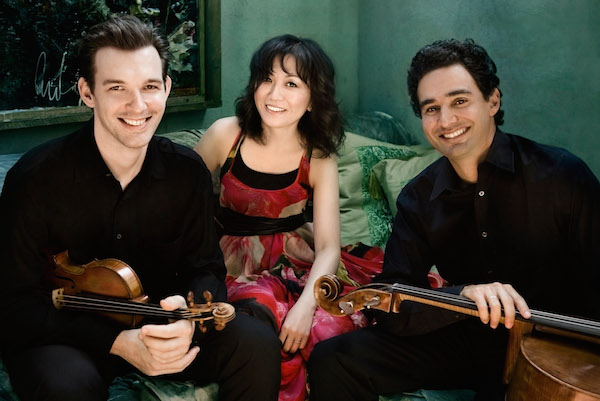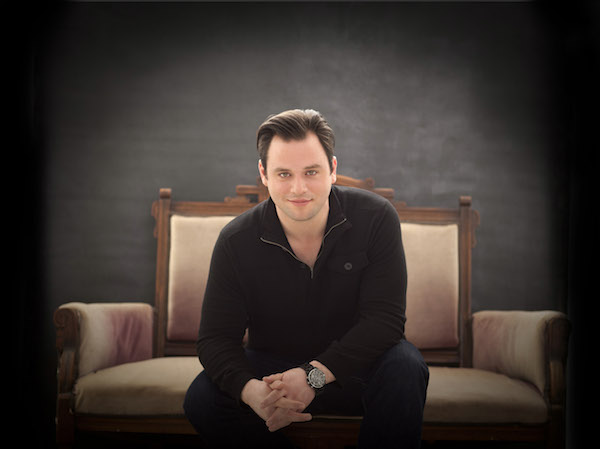(ANNANDALE-on-HUDSON, N.Y.) — The second and final weekend of the Bard Music Festival, now celebrating its Silver Jubilee with an exploration of “Schubert and His World,” opens on Friday, August 15, 2014, featuring several programs including “Beethoven’s Successor?” – an historic recreation of the sole public program that Schubert devoted entirely to his own music, with the Horszowski Trio’s account of his profound Piano Trio in E-flat as its centerpiece. The concert, in the Fisher Center at 8pm, also features Paul Appleby, tenor; the Harlem Quartet; Sarah Shafer, soprano; Zohar Schondorf, horn; Andrew Schroeder, baritone; Brian Zeger, piano; and members of the Bard Festival Chorale, James Bagwell, choral director.
Addressing the nature of Schubert’s originality and of his subsequent legacy and influence, “A New Aesthetics of Music” kicks off with a trio of special events, comprising performances of the Austrian composer’s Octet and Kosegarten Liederspiel settings, as well as showing of Fritz Lehner’s three-part film Notturno. Among the weekend’s other highlights are a pair of programs featuring the festival’s resident American Symphony Orchestra under the leadership of music director and festival co-artistic director Leon Botstein, who was recently recognized as “one of the most remarkable figures in the worlds of arts and culture” (THIRTEEN’s NYC-Arts). The first juxtaposes three of Schubert’s late choral works with Rendering, a completion of his unfinished tenth symphony by Luciano Berio, while the second presents Fierrabras, Schubert’s greatest though neglected opera, in a semi-staged production starring Joseph Kaiser, drawing the 25th anniversary season of the Bard Music Festival – and, indeed, the entire seven weeks of Bard SummerScape – to a gripping close.
Three vocal and chamber programs further contextualize Schubert. “The Music of Friendship” examines the lighter, more social fare for which he was best-known in his lifetime, while “The Final Months” presents some of his most important mature masterpieces, including his incomparable setting of Heine’s Der Doppelgänger, and the harrowing yet uplifting Piano Sonata in A, D959. “Fellowship of Men: The Male Choral Tradition” investigates the key role played by secular male choral singing in Austro-German culture, through works by Schubert, Michael Haydn, Mendelssohn, Schumann, Bruckner, Brahms, and others.
A free panel discussion on Saturday morning, moderated by Morten Solvik, one of Bard’s two Scholars-in-Residence, considers “Music’s ‘Far Fairer Hopes’: Originality and Influence,” and five of the weekend’s six programs are augmented by pre-concert talks from distinguished experts, namely John M. Gingerich, Walter Frisch, Scott Burnham, Michael P. Steinberg, and Bard’s co-artistic director and second Scholar-in-Residence, Christopher H. Gibbs. Solvik also provides illuminating commentary to the performance of Schubert’s Kosegarten Liederspiel, a set of the musical charades so popular within Schubert’s circle.
As in previous seasons, Weekend Two’s choral programs feature the Bard Festival Chorale directed by James Bagwell, and among the many other notable musicians who perform are tenor Paul Appleby, “a marvel: an intelligent young singer equipped with the elegance and expressivity of an old pro” (New York magazine); tenor Joseph Kaiser, silver medalist in the Operalia International Opera Competition; Laura Flax, principal clarinetist with the New York City Opera, American Symphony, and Bard Festival Orchestras; and pianist Piers Lane, for whom “no praise could be high enough” (Gramophone).
Bard’s sensationally popular European Spiegeltent will be open for lunch and dinner throughout “Schubert and His World.”
Program details of 2014 Bard Music Festival, “Schubert and His World”
WEEKEND TWO: A New Aesthetics of Music
Friday, August 15
SPECIAL EVENTS
The “Path toward a Grand Symphony”: Schubert’s Octet
László Z. Bitó ’60 Conservatory Building
3 pm Performance: Faculty and students of The Bard College Conservatory of Music
Schubert’s Kosegarten Liederspiel
László Z. Bitó ’60 Conservatory Building
5 pm Performance: Commentary by Morten Solvik; with Paul Appleby, tenor; Deanna Breiwick, soprano; Rebecca Ringle, mezzo-soprano; Reiko Uchida, piano
Schubert on Film
Weis Cinema, Bertelsmann Campus Center
11 am Introduction by Christopher H. Gibbs
11:30 am Screening of Notturno: Mit meinen heissen Tränen; Fritz Lehner, 1986, 3 parts, approx. 90 minutes each
Free and open to the public
PROGRAM SEVEN
Beethoven’s Successor?
Sosnoff Theater
7:30 pm Pre-concert Talk: Christopher H. Gibbs
8 pm Performance: Paul Appleby, tenor; Harlem Quartet; Horszowski Trio; Sarah Shafer, soprano; Zohar Schondorf, horn; Andrew Schroeder, baritone; Brian Zeger, piano; members of the Bard Festival Chorale, James Bagwell, choral director
Franz Schubert (1797–1828)
First Movement from String Quartet in D minor, D810 (1824)
Fragment aus dem Aeschylus, D450 (1816)
Die Allmacht, D852 (1825)
Der Wanderer an den Mond, D870 (1826)
Schlachtgesang, D912 (1827)
Ständchen, D920 (1827)
Piano Trio in E-flat, D929 (1827)
Der Kreuzzug, D932 (1827)
Die Sterne, D939 (1828)
Auf dem Strom, D943 (1828)
Saturday, August 16
PANEL TWO
Music’s “Far Fairer Hopes”: Originality and Influence
Morten Solvik, moderator; Scott Burnham; Kristina Muxfeldt; Richard Wilson
Olin Hall
10 am–noon
Free and open to the public
PROGRAM EIGHT
The Music of Friendship
Olin Hall
1 pm Pre-concert Talk: John M. Gingerich
1:30 pm Performance: Paul Appleby, tenor; Deanna Breiwick, soprano; Laura Flax, clarinet; Andrew Garland, baritone; Marc Goldberg, bassoon; Benjamin Hochman, piano; Horszowski Trio; Piers Lane, piano; Rebecca Ringle, mezzo-soprano; Reiko Uchida, piano; and others
Franz Schubert (1797–1828)
Gondelfahrer, D809 (1824)
Abschied von der Erde, D829 (1826)
Widerspruch, D865 (1826)
Grab und Mond, D893 (1826)
Zur guten Nacht, D903 (1827)
Selections from 12 Waltzes (Valses Nobles), D969 (1827)
Works by Ferdinand Schubert (1794-1859); Anselm Hüttenbrenner (1794–1868); Josef Lanner (1801–43); Benedict Randhartinger (1802–93); Franz Lachner (1803–90); Maximilian Leidesdorf (1787–1840); and others
PROGRAM NINE
Late Ambitions
Sosnoff Theater
7 pm Pre-concert Talk: Walter Frisch
8 pm Performance: Paul Appleby, tenor; Andrew Garland, baritone; Sarah Shafer, soprano; Rebecca Ringle, mezzo-soprano; Bard Festival Chorale, James Bagwell, choral director; American Symphony Orchestra, conducted by Leon Botstein, music director
Franz Schubert (1797–1828)
Miriams Siegesgesang, D942 (1828)
Mass in E-flat, D950 (1828)
Psalm 92, D953 (1828)
Luciano Berio (1925–2003)
Rendering (1990)
Sunday, August 17
PROGRAM TEN
Fellowship of Men: The Male Choral Tradition
Olin Hall
10 am Performance: Members of the Bard Festival Chorale, James Bagwell, choral director; Teresa Buchholz, mezzo-soprano; Theo Lebow, tenor; Frank Corliss, piano
Works by Franz Schubert (1797–1828); Michael Haydn (1737–1806); Simon Sechter (1788–1867); Heinrich Marschner (1795–1861); Jan Kalivoda (1801–66); Franz Lachner (1803–90); Felix Mendelssohn (1809–47); Robert Schumann (1810–56); Johannes Brahms (1833–97); Anton Bruckner (1824–96); and others
PROGRAM ELEVEN
The Final Months
Olin Hall
1 pm Pre-concert Talk: Scott Burnham
1:30 pm Performance: Deanna Breiwick, soprano; Laura Flax, clarinet; Andrew Garland, baritone; Piers Lane, piano; Anna Polonsky, piano; Orion Weiss, piano; Scott Williamson, tenor
Franz Schubert (1797–1828)
Rondo in A for piano four hands, D951 (June 1828)
Der Doppelgänger, D957/13 (August 1928)
Piano Sonata in A, D959 (September 1828)
Der Hirt auf dem Felsen, D965 (October 1828)
Die Taubenpost, D965 A (October 1828)
PROGRAM TWELVE
Schubert and Opera
Sosnoff Theater
3:30 pm Pre-concert Talk: Michael P. Steinberg
4:30 pm Performance: Eric Barry, tenor; Cecelia Hall, soprano; Sara Jakubiak, soprano; Joseph Kaiser, tenor; Ryan Kuster, bass-baritone; Andrew Schroeder, baritone; Alfred Walker, bass-baritone; Bard Festival Chorale, James Bagwell, choral director; American Symphony Orchestra, conducted by Leon Botstein, music director, and others; directed by Dmitry Troyanovsky; designed by Zane Pihlstrom; video projections by S. Katy Tucker; lighting design by Jeanette Yew
Franz Schubert (1797–1828)
Fierrabras, D796 (1823)
Bard SummerScape ticket information
For tickets and further information on all SummerScape events, call the Fisher Center box office at 845-758-7900 or visit Fisher Center.


